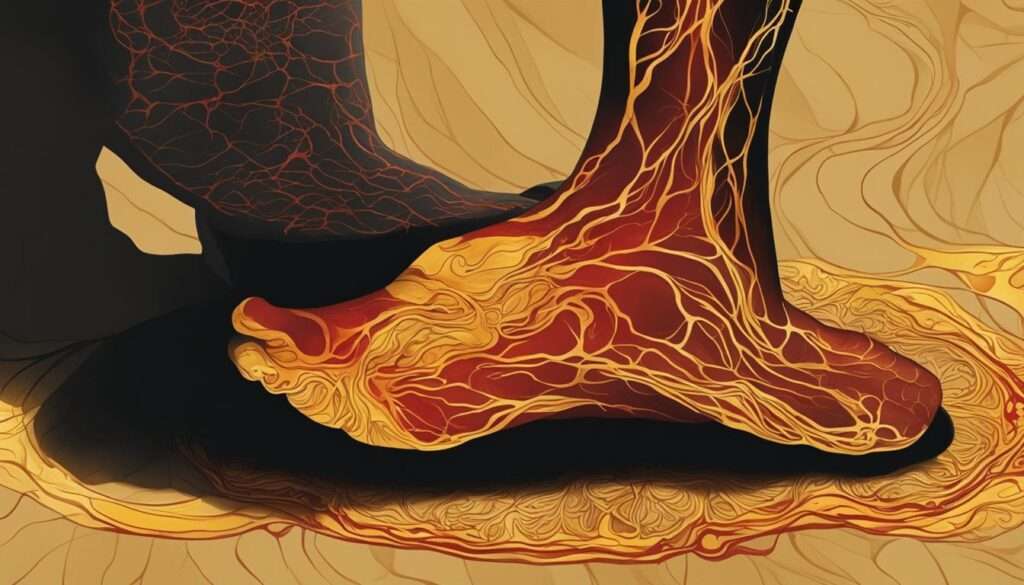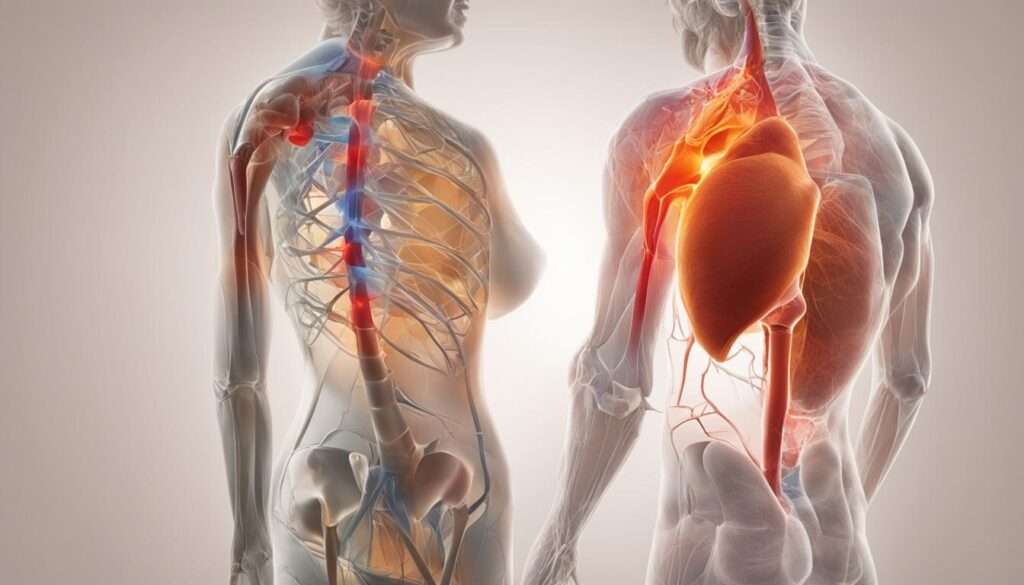There is a shocking link between your feet and your liver? It may sound surprising, but your liver plays a crucial role in your overall health, and certain foot symptoms can indicate underlying liver issues. Understanding this connection is important for maintaining liver function and overall well-being.
Your liver is an incredible organ that performs more than 500 essential functions in your body. It filters blood, removes waste, and produces bile. But what does this have to do with your feet? Well, it turns out that various foot symptoms can be a sign of liver problems, such as liver disease, swelling, itching, joint pain, and numbness.
Yes, you read that correctly—your feet can hold clues about the health of your liver! This intriguing link stems from the ancient healing practice known as reflexology.
Recognizing these foot symptoms and their potential connection to liver issues is crucial for early detection and management. By paying attention to your foot health, you can take proactive measures to support liver function and avoid potential complications.
Key Takeaways:
- There is a significant connection between foot health and liver function.
- Foot symptoms like swelling, itching, joint pain, and numbness can indicate liver issues.
- Early detection of liver problems through foot symptoms can lead to better health outcomes.
- Taking care of your feet is essential for supporting liver health.
- Consulting a healthcare professional for evaluation and treatment is important if you experience concerning foot symptoms.
An Intriguing Connection Between Feet and Liver Health
You might be wondering how exactly your feet are linked to your remarkable liver. The answer lies in the ancient practice of reflexology. Reflexology is based on the concept that specific points on the feet, known as reflex points, correspond to various organs and systems within the body.
By stimulating these reflex points through massage or pressure techniques, it is believed that imbalances or blockages in corresponding organs can be alleviated and overall health can be improved. Interestingly, the liver has its reflex point located on both feet.
Applying pressure or massage to this specific area can potentially stimulate liver function and promote a healthier liver. This connection between our feet and such a vital organ as the liver underscores the interconnectivity of our body’s systems. It highlights the potential for alternative practices like reflexology to influence our overall well-being
Liver Disease and Swollen Feet
The uncomfortable symptom of swollen feet is frequently present with liver disease. When the liver is not functioning properly, it can result in fluid retention in the lower extremities, leading to swelling of the feet, ankles, and legs.
Conditions such as cirrhosis, hepatitis B and C, liver cancer, and fatty liver disease contribute to this symptom. Swollen feet can occur due to the liver’s inability to effectively filter and remove excess fluid from the body.
If you notice persistent swelling in your feet or experience discomfort, it is important to consult a healthcare professional. Proper diagnosis and treatment of liver conditions can help manage the symptoms of foot swelling and prevent further complications.
Recognizing the connection between liver disease and swollen feet is crucial in addressing underlying health issues and seeking appropriate medical care.

Causes of Swollen Feet in Liver Disease
The swelling of feet in liver disease, also known as peripheral edema, occurs due to several factors related to the liver’s compromised function. These include:
- Impaired blood flow: Liver diseases can lead to increased pressure in the blood vessels, causing fluid to leak into surrounding tissues.
- Decreased protein production: The liver plays a vital role in producing proteins necessary for maintaining fluid balance in the body. When liver function is compromised, protein production may decrease, resulting in fluid retention.
- Portal hypertension: Liver diseases such as cirrhosis can cause a condition called portal hypertension, where blood flow is obstructed, leading to fluid accumulation in the lower extremities.
Treatment and Management
Treating swollen feet in liver disease involves addressing the underlying liver condition and managing fluid retention. Treatment options may include:
- Medication: Diuretics or water pills can be prescribed to help reduce fluid buildup and alleviate swelling.
- Lifestyle modifications: Limiting salt intake and engaging in regular exercise can assist in managing fluid retention in the feet.
- Dietary changes: Following a balanced diet that supports liver health and avoiding alcohol can aid in improving liver function and reducing swelling.
It is important to consult with healthcare professionals for proper diagnosis and personalized treatment plans, considering the specific liver disease and its severity. Managing liver disease and addressing swollen feet can help improve overall health and quality of life.
Itchy Feet and Liver Disease
One of the surprising symptoms that can indicate liver disease is itchy feet. Liver dysfunction and conditions like hepatitis have been linked to itchiness, particularly in the extremities.
If you’re experiencing persistent itchiness in your feet, it’s important to seek medical advice for further evaluation and treatment.
While moisturizing routines may offer temporary relief, addressing the underlying liver-related issues is crucial to managing the symptoms effectively.
Itchy feet can also serve as a potential sign of other liver-related problems, making it imperative not to overlook this symptom. By recognizing and addressing itchy feet, you can potentially identify and mitigate underlying liver issues before they worsen.
To ensure proper diagnosis and treatment, consulting with a healthcare professional is essential. They can evaluate your liver function and determine the appropriate course of action based on your individual needs.
Remember, taking proactive steps toward managing and addressing itchy feet can contribute to maintaining your overall liver health.

| Potential Causes of Itchy Feet in Liver Disease | Treatment Options |
|---|---|
| Hepatitis | Antiviral medication, rest, and hydration |
| Liver Dysfunction | Medications to manage symptoms and improve liver function, lifestyle changes |
| Other Liver-Related Problems | Individualized treatment plans based on the specific condition |
Joint Pain and Arthritis
Liver diseases can have an impact on joint health, leading to pain and discomfort, particularly in the feet. Conditions like cirrhosis and fatty liver disease can contribute to inflammation in the body, putting stress on the nerves and causing joint pain. Obesity, a common risk factor for liver issues, is also known to contribute to joint pain.
If you are experiencing foot pain or joint pain alongside other liver-related symptoms, it’s crucial to consult a healthcare professional for a proper evaluation and treatment plan. Managing liver conditions and addressing joint pain can improve your overall well-being.
How Liver Conditions Contribute to Joint Pain
Liver conditions, such as cirrhosis and fatty liver disease, can lead to joint pain through various mechanisms:
- Inflammation: Liver diseases can cause systemic inflammation, which can affect joints and lead to pain and stiffness.
- Metabolic imbalances: Liver dysfunction can alter the body’s metabolic processes, impacting joint health and causing pain.
- Nerve compression: Inflammation and fluid retention in the body can pressure nerves, resulting in joint pain.
Understanding the connection between liver health and joint pain is essential for early detection and intervention. By addressing liver issues and managing joint pain, individuals can improve their quality of life and overall health.

Addressing Joint Pain Alongside Liver Health
If you are experiencing joint pain and suspect liver involvement, here are some steps to consider:
- Consult a healthcare professional: A medical evaluation is crucial for diagnosing liver conditions and determining the most appropriate treatment options.
- Get regular exercise: Low-impact activities and exercises recommended by your healthcare professional can help manage joint pain and support liver health.
- Maintain a healthy weight: If obesity is a contributing factor to joint pain and liver issues, adopting a healthy, balanced diet and losing weight may be beneficial.
- Follow your treatment plan: Adhering to prescribed medications, lifestyle changes, and following up with healthcare appointments is essential for managing both liver conditions and joint pain.
- Consider alternative therapies: Some people find relief from joint pain through complementary therapies such as acupuncture, physical therapy, or massage. Discuss these options with your healthcare professional.
By prioritizing liver health and addressing joint pain, individuals can improve their overall well-being and quality of life. Seek medical guidance for a comprehensive treatment plan tailored to your specific condition.
| Joint Pain and Liver Conditions: | Foot Pain and Liver Disease: | Arthritis and Liver Problems: |
|---|---|---|
| Liver conditions can contribute to joint pain and inflammation. | Foot pain can be a symptom of liver disease and liver-related conditions. | Liver problems can contribute to the development or worsening of arthritis symptoms. |
| Joint pain can affect various joints in the body, including those in the feet. | Foot pain may manifest as a stabbing sensation, throbbing, or generalized discomfort. | The condition of the liver can affect arthritis, an autoimmune disease that causes joint inflammation. |
| Conditions such as cirrhosis and fatty liver disease are known to be associated with joint pain. | Liver disease can lead to foot pain due to inflammation, nerve compression, or metabolic imbalances. | Managing liver conditions can help alleviate arthritis symptoms and improve joint function. |
Numbness and Tingling in the Feet
People with liver conditions frequently experience numbness or tingling in their feet. Liver disease, such as hepatitis C infection or liver disease itself, can contribute to these sensations. Additionally, diabetes, a metabolic disorder often associated with liver issues, can also cause numbness and tingling in the feet.
One possible cause of these symptoms is peripheral neuropathy, which refers to nerve damage that occurs outside the brain and spinal cord. Liver-related conditions can lead to peripheral neuropathy, affecting the nerves in the feet and causing sensations of numbness or tingling.
If you are experiencing persistent numbness or tingling in your feet, it is essential to seek medical attention. A healthcare professional can evaluate your symptoms, perform diagnostic tests, and determine the underlying cause. Early intervention and treatment can help manage the symptoms and potentially slow the progression of liver-related conditions.
Peripheral Neuropathy and Liver Disease
Peripheral neuropathy associated with liver disease can result from various factors:
- Metabolic abnormalities caused by liver dysfunction, such as imbalances in electrolytes or vitamins
- Toxic substances accumulating in the bloodstream due to impaired liver function
- Autoimmune responses targeting the nerves
Awareness of the foot symptoms associated with liver conditions can play a crucial role in early detection and timely management. Seeking medical attention is vital to address and accurately diagnose these symptoms, as they may indicate an underlying liver issue that requires treatment.
Remember, proper medical evaluation and diagnosis are necessary to determine the cause of numbness and tingling in the feet. Do not self-diagnose or ignore persistent symptoms, as they may be early warning signs of significant health conditions.
Early intervention is key in managing the symptoms associated with numbness and tingling in the feet. Prompt medical attention can lead to better outcomes and potentially improve overall liver health.
Managing Numbness and Tingling in the Feet
While medical treatment is essential, there are steps you can take to manage numbness and tingling in the feet associated with liver conditions:
- Maintain a healthy lifestyle: Eating a balanced diet, exercising regularly, and managing conditions, such as diabetes or obesity, can help support overall liver and nerve health.
- Practice good foot care: Keeping your feet clean and dry, wearing comfortable shoes, and avoiding prolonged pressure or tight footwear can help alleviate symptoms.
- Follow medical advice: Consult healthcare professionals to determine the appropriate treatment plan for your liver condition and associated symptoms.
Taking steps to manage symptoms and support liver health can have a positive impact on overall well-being. By prioritizing foot care and seeking appropriate medical attention, you can take an active role in your liver health journey.
| Liver Conditions | Treatment Approaches |
|---|---|
| Hepatitis C infection | Antiviral medications, lifestyle modifications |
| Liver disease | Medication, dietary changes, liver transplant (in severe cases) |
| Diabetes | Blood sugar management, lifestyle changes, medication |
The Importance of Foot Care for Liver Health
Proper foot care is essential for maintaining liver health. Our feet play a critical role in our overall well-being, and taking care of them can have a positive impact on liver function.
One important aspect of foot care is regular hygiene. Keeping your feet clean and dry helps prevent infections and skin conditions that can affect liver health. Moisturizing your feet regularly with a suitable lotion or cream can help maintain skin integrity and prevent dryness, cracks, and discomfort.
“Taking care of your feet is like taking care of your liver’s first line of defense.”
When it comes to foot health and liver diseases, prevention is key. By paying attention to foot symptoms and seeking prompt medical attention, you can prevent or manage liver-related conditions effectively.
In addition to hygiene, engaging in exercises that promote foot health can also benefit liver function. Regular stretching and strengthening exercises for the feet can enhance blood circulation, reduce inflammation, and promote overall foot health. Examples of foot exercises include toe raises, ankle rotations, and stretches targeting the calf muscles.
“A few minutes devoted to foot exercises can go a long way in supporting liver health.”
Furthermore, addressing foot symptoms promptly is crucial for maintaining liver health. Certain foot problems, such as swelling, itchiness, joint pain, and numbness, can be early indicators of underlying liver issues. Seeking medical attention and addressing these symptoms promptly can help prevent or manage liver-related conditions effectively.
| Beneficial Foot Care Practices for Liver Health |
|---|
| Regular foot hygiene, including proper cleaning and drying |
| Moisturizing feet with a suitable lotion or cream |
| Engaging in foot exercises and stretching routines |
| Promptly addressing foot symptoms such as swelling, itching, and pain |
| Seeking medical attention for proper evaluation and treatment |
By prioritizing foot care and adopting these practices, you can support your liver’s health and overall well-being. Remember, your feet are not only connected to the ground but also intimately connected to your liver’s function. Taking care of your feet means taking care of your liver!
The Foot-Liver Connection: Insights and Symptoms
Your feet can provide valuable insights and indicators of liver health. Paying attention to your foot symptoms can help in the early detection and treatment of underlying liver issues. Here are some foot symptoms that may indicate liver conditions:
- Yellowing of the skin and nails: Also known as jaundice, yellowing of the skin and nails can be a sign of liver problems.
- Swelling: Edema or swelling in the feet and ankles may indicate fluid retention caused by liver dysfunction.
- Spider veins: The appearance of spider veins on the feet can be a symptom of liver disease.
- Itchiness: Liver conditions can cause itching, and this symptom can often manifest on the feet.
- Clubbing of the toes: Clubbing is a condition in which the nail beds become enlarged, curved, and shiny, and it can be associated with liver issues.
- Pale or white nails: Liver disease can affect the color and health of the nails, leading to pale or white nail beds.
- Foot pain: Liver problems can cause generalized pain or discomfort in the feet.
- Dry and cracked skin: Liver dysfunction can lead to dryness and cracking of the skin on the feet.
- Nail changes: Changes in the texture, shape, or thickness of the nails can be a result of liver conditions.
If you experience any of these foot symptoms, it is crucial to seek medical evaluation and diagnosis. Early detection and treatment of liver issues can significantly improve health outcomes. By paying attention to your foot health, you can gain valuable insights into your liver function and overall well-being.
Liver Conditions and Treatments
When it comes to liver health, understanding the various liver conditions and available treatments is essential. The liver plays a vital role in our overall well-being, and any abnormalities or diseases that affect this organ require prompt attention and appropriate management. Let’s explore some common liver conditions and the treatments that are typically employed.
Hepatitis
Hepatitis refers to inflammation of the liver, often caused by viral infections, alcohol abuse, or autoimmune disorders. There are several types of hepatitis, including hepatitis A, B, C, D, and E. Treatment options for hepatitis may include antiviral medications, rest, fluids, and lifestyle modifications such as avoiding alcohol and certain medications.
Cirrhosis
Cirrhosis occurs when healthy liver cells are replaced with scar tissue, impairing liver function. This condition may result from chronic alcohol abuse, viral hepatitis, or non-alcoholic fatty liver disease. Treatment for cirrhosis focuses on managing complications, such as controlling fluid retention, preventing infections, and addressing nutritional deficiencies. In some cases, liver transplantation may be necessary.
Fatty Liver Disease
Fatty liver disease is a condition characterized by the accumulation of fat in the liver. It can occur due to excessive alcohol consumption (alcoholic fatty liver disease) or unrelated to alcohol use (non-alcoholic fatty liver disease). Treatment for fatty liver disease involves lifestyle modifications, such as losing weight, controlling blood sugar levels, and avoiding alcohol.
Liver Cancer
Liver cancer, also known as hepatocellular carcinoma, is a malignant tumor that originates in the liver. Treatment options for liver cancer depend on the stage of the disease and may include surgical removal of the tumor, liver transplantation, radiation therapy, chemotherapy, and targeted drug therapy. Early detection and intervention are crucial for improved outcomes.
| Liver Condition | Treatment Options |
|---|---|
| Hepatitis | Antiviral medications, rest, fluids, lifestyle modifications |
| Cirrhosis | Complication management, fluid control, infection prevention, nutritional support, liver transplantation |
| Fatty Liver Disease | Lifestyle modifications, weight loss, blood sugar control, alcohol avoidance |
| Liver Cancer | Tumor removal, liver transplantation, radiation therapy, chemotherapy, targeted drug therapy |
It is important to note that liver conditions and their respective treatments should be assessed and monitored by healthcare professionals. The choice of treatment depends on factors such as the specific liver diagnosis, the severity of the condition, and the overall health of the individual.
Diagnosis and management of liver diseases require a multidisciplinary approach, often involving hepatologists, gastroenterologists, surgeons, and other specialists.
Working closely with healthcare professionals will ensure the development of a personalized treatment plan tailored to individual needs.
Conclusion
The shocking link between your feet and your liver highlights the crucial role of foot health in maintaining overall liver function. By paying attention to various foot symptoms and addressing them promptly, we can achieve early detection and improved health outcomes related to liver conditions.
It is essential to prioritize foot care, including proper hygiene and regular exercise, to support liver health.
When we take care of our feet, we are also taking care of our liver. Maintaining liver function through foot care involves seeking medical attention for any concerning foot symptoms, as these can provide valuable clues about underlying liver issues.
By addressing foot problems early on, we can detect and manage liver conditions more effectively.
Remember, your feet play a significant role in indicating the state of your liver. So, let’s prioritize foot health to optimize liver function.
Let’s take the necessary steps, such as practicing good foot hygiene, engaging in regular foot exercises, and seeking professional advice when needed. By doing so, we can support the health of our liver and ensure overall well-being.
FAQ
What foot symptoms can indicate liver issues?
Certain foot symptoms, such as swelling, itching, joint pain, and numbness, can be indicators of liver issues, including liver disease and dysfunction.
Why might liver disease cause swollen feet?
Liver disease can cause a buildup of fluid in the feet, ankles, and legs, leading to swelling. This fluid retention is known as edema.
Can itchy feet be a symptom of liver disease?
Yes, liver dysfunction and diseases like hepatitis can cause itchiness in the feet, among other symptoms.
How can liver conditions contribute to joint pain and arthritis in the feet?
Conditions like cirrhosis and fatty liver disease can lead to inflammation in the body, including the joints. This inflammation can cause foot pain and contribute to arthritis.
Can liver conditions cause numbness or tingling in the feet?
Yes, liver conditions such as hepatitis C infection and liver disease itself can lead to peripheral neuropathy, which is nerve damage that can cause numbness and tingling sensations in the feet.
How does foot care impact liver health?
Proper foot care, including hygiene, moisturization, and exercises, can support overall liver health. Addressing foot symptoms promptly and seeking medical attention when needed can help prevent or manage liver-related conditions.
What are some foot symptoms that can indicate underlying liver conditions?
Foot symptoms such as yellowing of the skin and nails, swelling, itchiness, spider veins, clubbing of the toes, pale or white nails, foot and joint pain, dry and cracked skin, and nail changes can all be signs of underlying liver conditions.
What are some common liver conditions, and how are they treated?
Common liver conditions include hepatitis, cirrhosis, fatty liver disease, and liver cancer. Treatment options may include medication, lifestyle changes, surgery, or liver transplantation in severe cases. Individual treatment plans should be developed with healthcare professionals based on the specific liver diagnosis.
How important is foot health for overall liver function?
Foot health plays a significant role in supporting liver function. Proper foot care, attention to foot symptoms, and early detection of liver issues can all contribute to maintaining optimal liver health.






